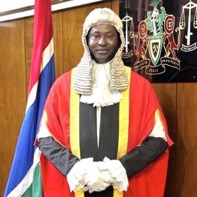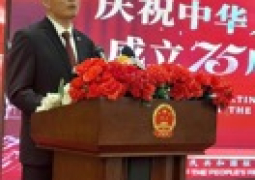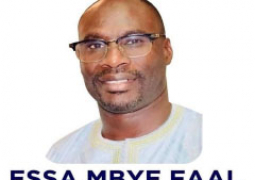
The reprimand followed Conteh’s outburst during cross-examination in which he brazenly accused Abubacarr Jawara, the CEO of GACH Global of lying. Justice Jaiteh, visibly displeased, denounced the conduct as “wholly unacceptable” and made it unequivocally clear that such words would not be tolerated in his courtroom.
Counsel Conteh responded: “My Lord, such expressions are frequently used in court. All lawyers use that phrase. The choice of words is common both in this courtroom and in others.”
Justice Jaiteh firmly replied: “Not in my court. I do not accept such language here, and that is precisely why we are establishing clear protocols going forward. You cannot tell a witness ‘you are lying’ in my courtroom. You must use a phrase that conveys your point in a more appropriate manner. That is an insult. If someone came to you and said ‘you are a liar’, you would feel insulted. Language that is insulting will not be tolerated. If it is acceptable in other courts, so be it but not in mine.”
Counsel Conteh initially asked the witness: “Is it correct that during the last adjourned date, when you were cross-examined by Lawyer K. Jallow, you stated you were not certain that the money shown in the viral video belonged to you?” The witness responded: “Before I met the third person, I said it wasn’t my money. However, after meeting the third person, I clearly confirmed that the money in the viral video does indeed belong to me.”
As the witness was explaining, Counsel Conteh interjected: “You are lying to this court. In your previous answer, you said you were unsure whether the money the second defendant was counting was yours.” Jawara maintained his earlier position, stating categorically: “Before I met the third person, I wasn’t sure it was my money. However, after that meeting, I realised that the money is mine.”
Counsel Conteh persisted: “When we consult the court record, we will prove that you are lying to this court.” The witness retorted, “Well, that’s your opinion.”
At this stage, Lawyer Drammeh, counsel for the plaintiff, intervened: “My learned colleague is claiming, based on what he read in the newspaper, that the witness is lying. With all due respect, I believe he should have referred to the court record to verify what was actually said, rather than relying on an article written by Kex.”
Counsel Conteh responded: “My Lord, I respectfully request my learned friend to allow me to continue with the witness. I acknowledge that Kex sometimes publishes verbatim reports, but I will still refer to the official court record.” At this point, Justice Jaiteh intervened: “I believe counsel Drammeh’s concern is valid. As an officer of the court, your references should be drawn from the official record of proceedings. Newspaper publications do not constitute a proper court record.”
He added: “Furthermore, we should avoid using strong language, as in our cultural context, it may be deemed insulting, citing the Evidence Act.”
Justice Jaiteh stated: “In our culture, referring to someone in such a manner is considered deeply insulting. If you were to walk through the streets of this country or enter any compound and say such things, you would likely provoke a confrontation. Therefore, we must be mindful of our language and choice of words.
“Furthermore, your claims are based on a newspaper article, not the official record of the court. A newspaper publication does not constitute a proper record of proceedings. The English language offers a wide range of vocabulary, but there are specific words I will not permit in my courtroom.”
Conteh again in response to Justice Jaiteh: “My Lord, it appears you are drawing a conclusion. From the outset of this case, you have consistently ruled against me. Every submission I make is rejected, while similar submissions from others are accepted. I find this treatment extremely unfair.”
Justice Jaiteh stated: “I have instructed the court registrar to provide you with the record of proceedings from the last sitting. You may review it and identify any inconsistencies in the witness's testimony. However, going forward, while cross-examining in my court, I will not permit the use of certain language. This applies not only to you but equally to Counsel Camara, Counsel Drammeh, and every other advocate who appears before me. I am not here to favour any counsel. I have no interest in the outcome of this case, I do not know any of the parties involved, and my duty is solely to uphold the law and ensure justice is properly applied.”
Counsel Conteh rose once more, saying: “My Lord, I have not been treated fairly since the beginning of this case. Every submission I make is ruled against, while similar submissions from my colleagues are accepted. There have been numerous occasions where unauthenticated documents were admitted into evidence when submitted by others, yet I am denied when I attempt the same.”
Senior Counsel Camara stood and remarked: “My Lord, we have absolute confidence in the integrity of this court. I offer my sincere apology for the remarks made by my learned colleague and respectfully urge your Lordship to disregard those comments. We reaffirm our trust in the administration of justice and in your Lordship’s impartiality.” He echoed sentiments previously expressed by Senior Counsel Drammeh.
Justice Jaiteh replied: “I hold no interest in this matter. If counsel truly believes he is being treated unfairly, there are other judges available, and the case may be transferred to another court, that would be less work for me.
Concluding, he said: “I must emphasise that we must speak with care and responsibility. If you feel that Justice Jaiteh is not treating you fairly, there is a proper channel to follow. You may apply to recuse yourself from continuing. A simple two paragraph letter to the Chief Justice would suffice, and I would gladly step away from the matter. However, I will not accept any attempt to tarnish my name. My integrity and my professional reputation are of the utmost importance, and I will defend them accordingly.”




